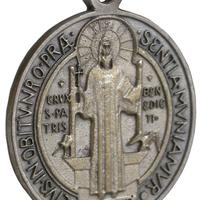Capita 53-57
Caput LIII. De Hospitibus Suscipiendis.
Omnes supervenientes hospites tamquam Christus suscipiantur, quia ipse dicturus est: “Hospes fui, et suscepistis me.” Et omnibus congruus honor exhibeatur, maxime tamen domesticis fidei, et peregrinis. Ut ergo nuntiatus fuerit hospes, occurratur ei a Priore vel a Fratribus, cum omni officio charitatis : et primitus orent pariter, et sic sibi socientur in pace. Quod pacis osculum non prius offeratur, nisi oratione praemissa, propter illusiones diabolicas. In ipsa autem salutatione omnia exhibeatur humilitas. Omnibus venientibus sive discedentibus hospitibus, inclinato capite, vel prostrato omni corpore in terra, Christus in eis adoretur, qui et suscipitur.
Suscepti autem hospites ducantur ad orationem, et postea sedeat cum eis Prior, aut cui jusserit ipse. Legatur coram hospite lex divina, ut aedificetur, et post haec omnis ei exhibeatur humanitas. Jejunium a Priore frangatur propter hospitem; nisi forte praecipuus sit ille dies jejunii, qui non possit violari. Fratres autem consuetudines jejuniorum prosequantur. Aquam in manibus Abbas hospitibus det; pedes hospitibus omnibus tam Abbas, quam cuncta congregatio lavet; quibus lotis, hunc versum dicant: “Suscepimus, Deus, misericordiam tuam, in medio templi tui.” Pauperum autem, et peregrinorum maxime, susceptio omni cura sollicite exhibeatur : quia in ipsis magis Christus suscipitur. Nam divitum terror ipse sibi exigit honorem.
Coquina Abbatis et hospitum per se sit, ut incertis horis supervenientes hospites, qui nunquam desunt Monasterio, non inquietent Fratres. In quam coquinam ingrediantur duo fratres ad annum, qui ipsum officium bene impleant. Quibus, ut indigent, solatia administrentur, ut absque murmuratione serviant : et iterum quando occupationem minorem habent, exeant, ubi eis imperatur, in opera. Et non solum in ipsis, sed et in omnibus officiis Monasterii ista sit consideratio ; ut quando indigent, solatia accommodentur eis : et iterum quando vacant, obediant imperanti.
Item et cellam hospitum habeat assignatam frater, cujus animam timor Dei possideat; qui sint lecti strati sufficienter, et domus Dei a sapientibus sapienter administretur. Hospitibus autem, cui non praecipitur, nullatenus societur neque colloquatur: sed si obviaverit aut viderit, salutatis humiliter, ut dictum est, et petita benedictione, pertranseat dicens sibi non licere colloqui cum hospite.
Caput LIV. Si Debet Monachus Litteras, vel Eulogias Suscipere.
Nullatenus liceat Monacho nec a parentibus suis, nec a quoquam hominum, nec sibi invicem litteras, aut eulogias, vel quaelibet munuscula accipere aut dare, sine praecepto Abbatis sui. Quod si etiam a parentibus suis ei quicqnam directum fuerit, non praesumat suscipere illud, nisi prius indicatum fuerit Abbati. Quod si jusserit suscipi, in Abbatis sit potestate, cui illud jubeat dari: et non contristetur frater, cui forte directum fuerat, ut non detur occasio diabolo. Qui autem aliter praesumpserit, disciplinae regulari subjaceat.
Caput LV. De Vestimentis, et Calceamentis Fratrum.
Vestimenta fratribus secundum locorum qualitatem ubi habitant, vel aerum temperiem dentur, quia in frigidis regionibus amplius indigetur, in calidis vero minus. Haec ergo consideratio penes Abbatem sit. Nos tamen mediocribus locis sufficere credimus Monachis per singulos cucullam et tunicam: cucullam in hyeme villosam; in aestate puram et vetustam, et scapulare propter opera : indumenta pedum, pedules et caligas. De quarum rerum omnium colore aut grossitudine non causentur Monachi, sed quales inveniri possunt in provincia, qua degunt, aut quod vilius comparari potest.
Abbas autem de mensura provideat, ut non sint curta ipsa vestimenta utentibus eis, sed mensurata. Accipientes nova, vetera semper reddant in praesenti, reponenda in vestiario propter pauperes. Sufficit enim Monacho duas tunicas et duas cucullas habere propter noctes, et propter lavare ipsas res. Jam quod supra fuerit, superfluum est, et amputari debet. Et pedules, et quodcumque est vetustum, reddant, dum accipiunt novum. Femoralia hi qui diriguntur in via, de vestiario accipiant: qui revertentes lota ibi restituant. Et cucullae et tunicae sint aliquanto his, quas habere soliti sunt, modice meliores; quas exeuntes in viam accipiant de vestiario, et revertentes restituant.
Stramenta autem lectorum sufficiant, matta, sagum, lena et capitale. Quae tamen lecta frequenter ab Abbate scrutanda sunt, propter opus peculiare, ne inveniatur. Et si cui inventum fuerit, quod ab Abbate non acceperit, gravissimae disciplinae subjaceat. Et ut hoc vitium peculiare radicitus amputetur, dentur ab Abbate omnia quae sunt necessaria: id est, cuculla, tunica, pedules, caligae, bracile, cultellus, graphium, acus, mappula, tabulae, ut omnis auferatur necessitatis excusatio. A quo tamen Abbate semper consideretur illa sententia Actuum Apostolorum : quia “dabatur singulis, prout cuique opus erat.” Ita ergo et Abbas consideret infirmitatem indigentium, et non malam voluntatem invidentium. In omnibus tamen judiciis suis Dei retributionem cogitet.
Caput LVI. De Mensa Abbatis.
Mensa Abbatis cum hospitibus et peregrinis sit semper. Quoties tamen minus sunt hospites, quos vult de fratribus vocare, in ipsius sit potestate. Seniorum autem unum, aut duos semper cum fratribus dimittendos procuret, propter disciplinam.
Caput LVII. De Artificibus Monasterii.
Artifices, si sunt in Monasterio, cum omni humilitate et reverentia faciant ipsas artes, si tamen jusserit Abbas. Quod si aliquis ex eis extollitur pro scientia artis suae, eo quod videatur aliquid conferre Monasterio, hic talis evellatur ab ipsa arte, et denuo per eam non transeat, nisi forte humiliato ei iterum Abbas jubeat.
Si quid vero ex operibus artificum venumdandum est, videant ipsi, per quorum manus transigenda sunt, ne aliquam fraudem praesumant inferre. Memorentur Ananiae et Saphirae: ne forte mortem quam illi in corpore pertulerunt, hanc isti, vel omnes qui aliquam fraudem de rebus Monasterii fecerint, in anima patiantur. In ipsis autem pretiis non surripiat avaritiae malum, sed semper aliquantulum vilius detur, quam a secularibus datur, ut in omnibus glorificetur Deus.

